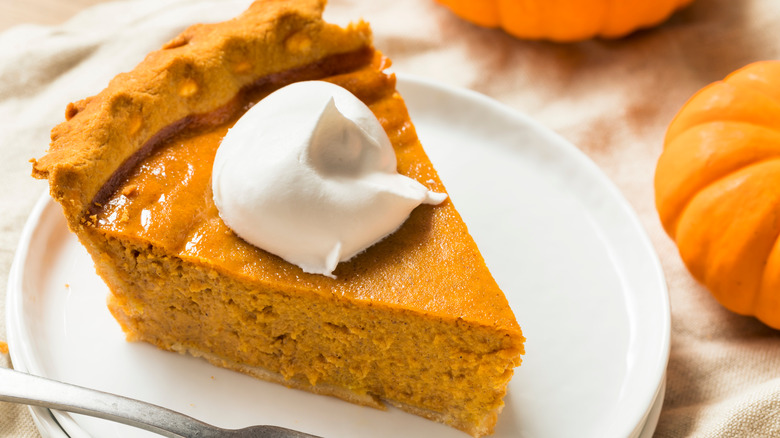Why The Word Pumpkin Doesn't Really Mean Anything
If it looks like a pumpkin and quacks like a pumpkin, it's probably a very maltreated duck. Still, it is with a similar level of certainty that we can bandy the word pumpkin about. Because even though we know a pumpkin is a pumpkin is a pumpkin, it turns out most of us do not know what a pumpkin actually is. Or, put it this way: What is the difference between a pumpkin and a squash? None, Food 52 states. The site explains that "there's no botanical distinction that makes a pumpkin a pumpkin."
You can see this on the website for the North Carolina Extension Gardener Plant Toolbox. Among their various pages, they have a section dedicated to cucurbita moschata and cucurbita pepo, two related families of gourd. Cucurbita moschata contains the species we recognize as butternut squash and pumpkin. Cucurbita pepo includes courgettes, winter squash, and pumpkins.
Real Simple clarifies the situation by explaining that the word "pumpkin" generally refers to squashes that are round and orange. The archetypal jack-o'-lantern pumpkin, for example, is really a winter squash. Pumpkin is a conventional name, not a scientific one.
A pumpkin is a pumpkin, even though there's no such thing
There really is no one thing that is a pumpkin. The same can be said of pumpkin pie.
According to HuffPost, 85% of canned pumpkin pie filling is made from Dickinson squash, which is more like a butternut squash than a winter squash. They continue to hammer home the point by writing how the pumpkin spices we really love are squash spices. Marie Wright, Chief Global Flavorist at ADM Nutrition, might disagree with this take; in an interview with The Takeout, she notes that what we really respond to is the cloves, ginger, and nutmeg that spice the pumpkin. "Pumpkin doesn't really taste like much," she said.
So, there is no real pumpkin flavor either. It's butternut squash or a mixture of spices. However, the FDA does approve of the advertised flavor of pumpkin because they do not think it misleads customers. Customers aren't misled because we use the word pumpkin to generally mean the flavors of butternut squash and spices. We all know what a pumpkin is, even if there really is no pumpkin for us to know.

